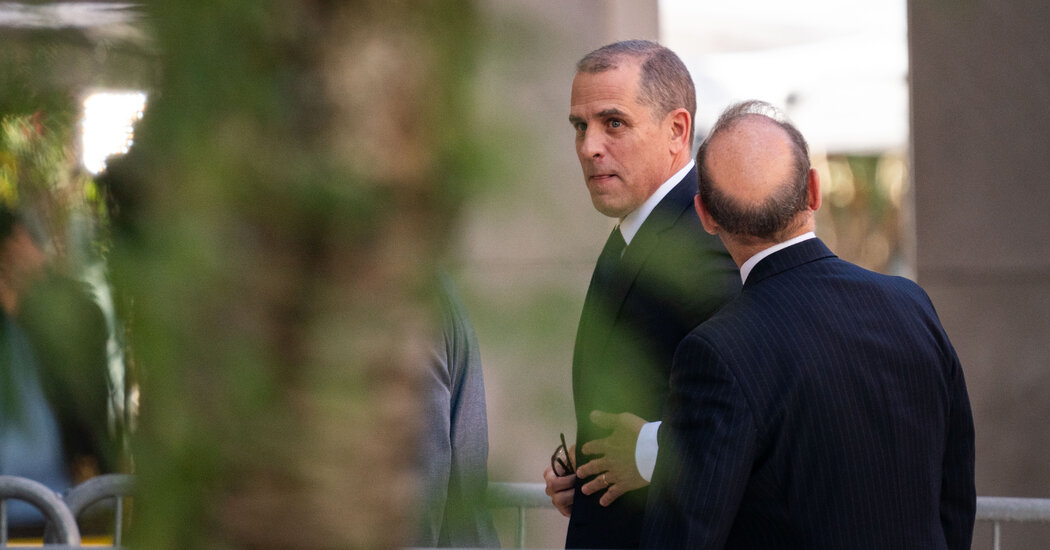Hunter Biden, the president’s son, pleaded not guilty in federal court on Tuesday to charges stemming from his purchase of a handgun in 2018, the latest development in an investigation that Republicans have tried to use to inflict political damage on his father.
During his arraignment in Wilmington, Del., Mr. Biden, 53, entered not guilty pleas on the three charges brought against him last month by the Justice Department: falsifying a federal firearms application, lying to a federally licensed gun dealer and possessing an illegally obtained gun for 11 days, from Oct. 12 to Oct. 23, 2018.
The charges are related to his statement on a federal form he filled out to purchase a Colt revolver five years ago that he was not a drug user. Mr. Biden has acknowledged he had long-running addictions to crack cocaine and alcohol.
If convicted, Mr. Biden could face up to 25 years in prison and $750,000 in fines. But nonviolent, first-time offenders who have not been accused of using the weapon in other crimes rarely receive serious prison time.
The workaday 30-minute hearing was held in a drab, second-floor courtroom before federal magistrate, Christopher J. Burke. Mr. Biden was released without any cash bond, and Judge Burke disclosed that Mr. Biden has continued to pass drug tests administered to him. No trial date was set.
Mr. Biden’s lawyer, Abbe Lowell, said he intended to file a motion seeking to have the gun charges dismissed on procedural and constitutional grounds, and suggested he might also request an additional hearing to contest the government’s evidence.
“These charges are the result of political pressure from President Trump and his MAGA allies to force the Justice Department to ignore the law and deviate from its policies in cases like this one,” Mr. Lowell said in a statement after the hearing.
Mr. Lowell did most of the talking during the hearing. He entered Mr. Biden’s not guilty plea.
Mr. Biden, sporting a new close-cropped haircut, only spoke a few times, and then only to say “yes, your honor,” when Judge Burke asked him if he understood the charges and his conditions of release.
He left the courtroom through a side door without taking questions.
In late July, Mr. Biden arrived at the same courthouse with hopes of putting his legal problems behind him after reaching a plea agreement with federal prosecutors that would have ended a five-year investigation into both the weapons charges and separate allegations that he had failed to pay his income taxes on time. The gun case would have been resolved with what is known as a pretrial diversion agreement, under which Mr. Biden would not be prosecuted if he remained drug-free for 24 months and agreed never to own a firearm again.
But the plea agreement imploded under questioning from a federal judge about a provision that would have provided him a degree of immunity from further charges. Last month, federal prosecutors brought an indictment on the gun charges. Mr. Biden still faces the possibility of the Justice Department charging him in the tax investigation.
If Tuesday’s hearing was routine in legal terms, it again focused attention on Mr. Biden’s sometimes lurid personal problems as Republicans assail President Biden with unproven accusations of political favoritism in the Justice Department’s investigation into his son and seek to portray the Biden family as corrupt.
The decision to file criminal charges against Hunter Biden last month was an extraordinary move by the Justice Department and David C. Weiss, whom Attorney General Merrick B. Garland named as a special counsel for the case in August.
Republicans have sought to show that Mr. Biden’s foreign business dealings were backed by and benefited his father, and have based their preliminary impeachment inquiry of the president on his son’s activities. The first hearing in the House on the matter, held last week, yielded no new information about the president’s conduct — or any support for Republicans’ accusations that President Biden had been directly involved with his son’s business deals.
Mr. Weiss’s team has signaled that it continues to investigate elements of Mr. Biden’s business activities. Those most likely include whether his lucrative consulting work with companies based in Ukraine, China and Romania violated the Foreign Agents Registration Act, which requires disclosing lobbying activities for other countries.
Mr. Lowell has argued that the indictment on the gun charges should be thrown out. Mr. Weiss is still legally bound by the previous diversion agreement, Mr. Lowell has said, accusing him of caving to pressure from supporters of former President Donald J. Trump, who called the plea agreement a sweetheart deal.
Mr. Biden’s lawyers have also asserted that the gun charges will ultimately be thrown out because Supreme Court and appeals court decisions have cast doubt on the constitutionality of federal limits on firearms purchases.





